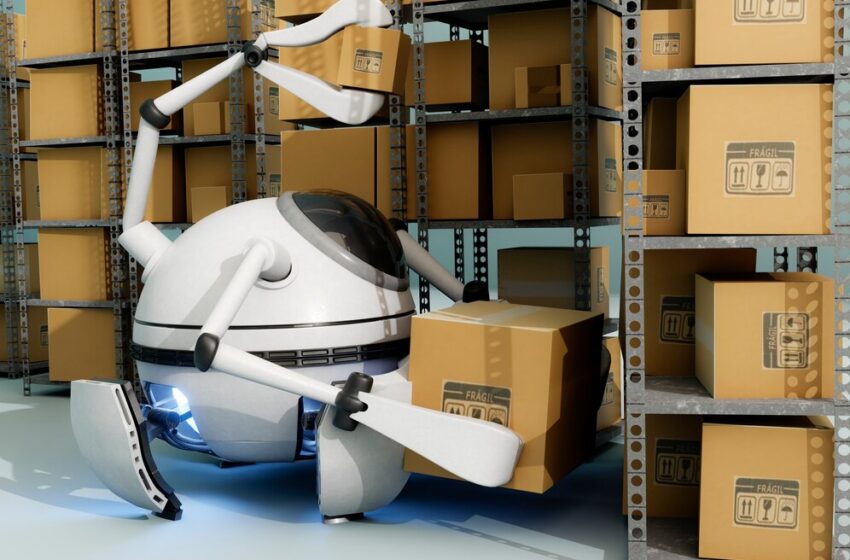AI’s Role in Streamlining Supply Chain Logistics

Introduction to AI in Supply Chain Logistics
Artificial Intelligence (AI) is revolutionizing industries across the globe, and supply chain logistics is no exception. By integrating AI, companies are enhancing efficiency, reducing costs, and improving service delivery. This technology’s ability to analyze large data sets and make intelligent decisions is particularly beneficial in managing the complex and dynamic nature of modern supply chains.
The Growing Need for AI in Supply Chains
As global supply chains become more intricate and customer expectations rise, the need for more efficient, reliable, and agile logistics is more critical than ever. AI offers solutions to these challenges by providing predictive insights, automating manual processes, and optimizing logistics operations.
Key Applications of AI in Supply Chain Logistics
1) Demand Forecasting:
- AI algorithms analyze historical data and market trends to predict future product demand accurately, helping companies manage inventory levels effectively.
- This predictive capability is crucial for reducing overstock or stockouts and for strategic planning.
2) Warehouse Automation:
- AI-driven robots and drones are increasingly used in warehouses for picking and stocking, significantly speeding up operations and reducing errors.
- Automation extends to inventory management, where AI systems track stock levels and reorder products as needed.
3) Route Optimization:
- AI optimizes delivery routes by considering factors like traffic conditions, weather, and vehicle capacity, reducing delivery times and fuel consumption.
- Real-time adjustments can be made as conditions change, ensuring the most efficient path is always taken.
4) Predictive Maintenance:
- By monitoring the condition of vehicles and equipment, AI predicts when maintenance is needed, preventing unexpected breakdowns and extending the lifespan of assets.
- Supplier Selection and Risk Management:
- AI helps in evaluating and selecting suppliers by analyzing performance history, compliance, and risk factors.
- Continuous monitoring allows companies to anticipate and mitigate potential disruptions in the supply chain.
The Benefits of AI in Logistics
- Increased Efficiency: AI automates repetitive tasks and optimizes operations, leading to faster, more efficient processes.
- Cost Reduction: By improving accuracy and efficiency, AI reduces costs associated with inventory errors, transportation, and unscheduled maintenance.
- Enhanced Customer Experience: AI enables faster delivery and more reliable service, enhancing customer satisfaction and loyalty.
- Agility and Resilience: AI’s predictive capabilities allow companies to respond quickly to market changes and disruptions, making supply chains more agile and resilient.
Challenges and Considerations
- Integration with Existing Systems: Integrating AI into legacy systems can be challenging and requires careful planning and execution.
- Data Quality and Availability: AI’s effectiveness depends on the quality and quantity of data available, necessitating robust data management practices.
- Skills and Expertise: Implementing and managing AI solutions requires a workforce with the necessary technical skills.
- Ethical and Privacy Concerns: Companies must navigate ethical issues and privacy regulations related to AI and data usage.
Strategies for Implementing AI in Logistics
- Start with Clear Objectives: Define what you want to achieve with AI, whether it’s reducing delivery times, minimizing costs, or improving forecasting.
- Focus on Data: Ensure you have access to high-quality, relevant data and invest in data management capabilities.
- Pilot and Scale: Start with pilot projects to demonstrate value and learn from the experience before scaling AI solutions across the supply chain.
- Invest in Talent: Develop the skills of your existing workforce and consider hiring or partnering with AI experts.
The Future of AI in Supply Chain Logistics
The use of AI in supply chain logistics is expected to grow exponentially as the technology advances and companies recognize its value. Future developments may include more sophisticated predictive analytics, autonomous vehicles for delivery, and AI-powered supply chain control towers that provide end-to-end visibility and decision-making capabilities.
Conclusion: Leveraging AI for Competitive Advantage
AI is set to become an integral part of supply chain logistics, offering significant advantages to those who adopt it. By improving efficiency, reducing costs, and enhancing service delivery, AI can provide a substantial competitive edge. However, reaping these benefits requires a strategic approach, focusing on data, integration, and skill development. As companies continue to navigate the complexities of modern supply chains, AI stands out as a powerful ally in streamlining operations and driving business success.







